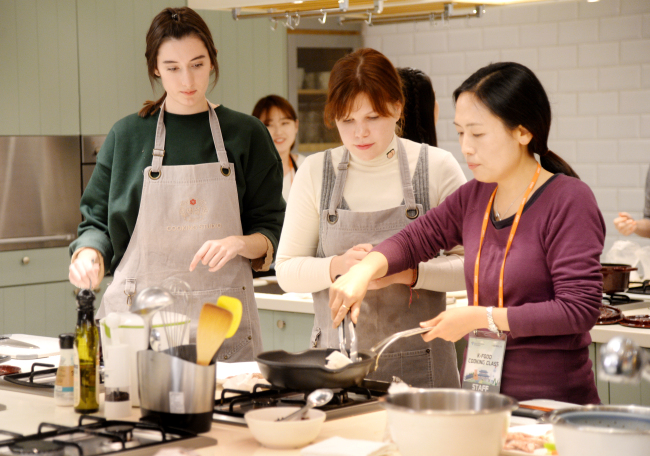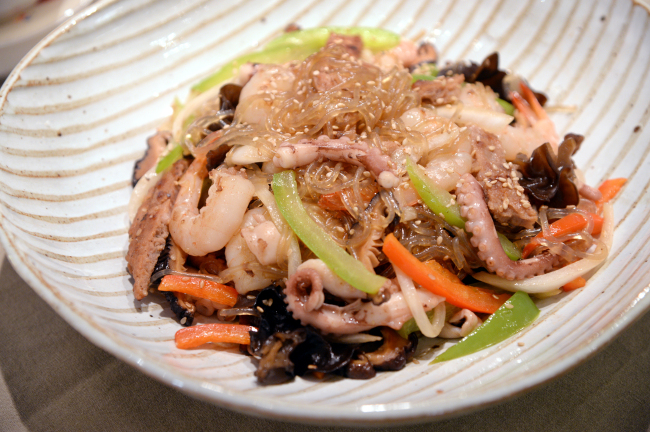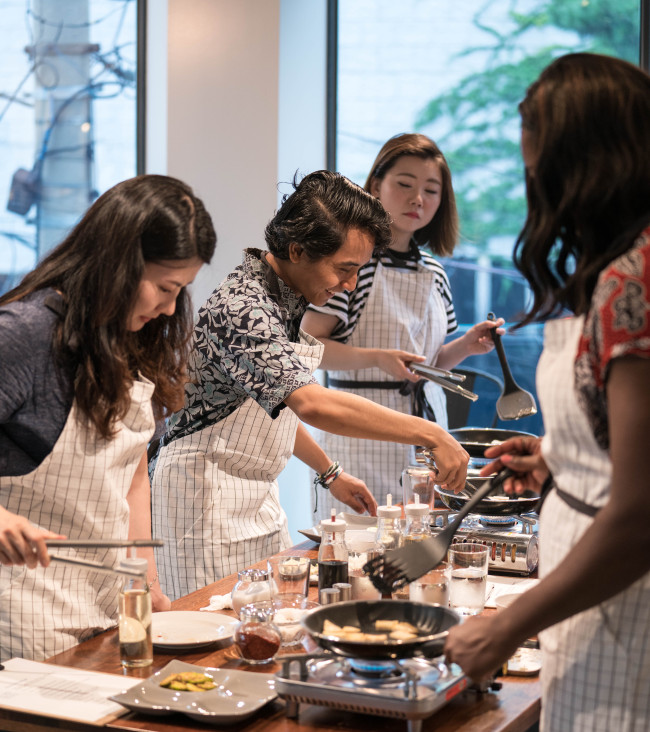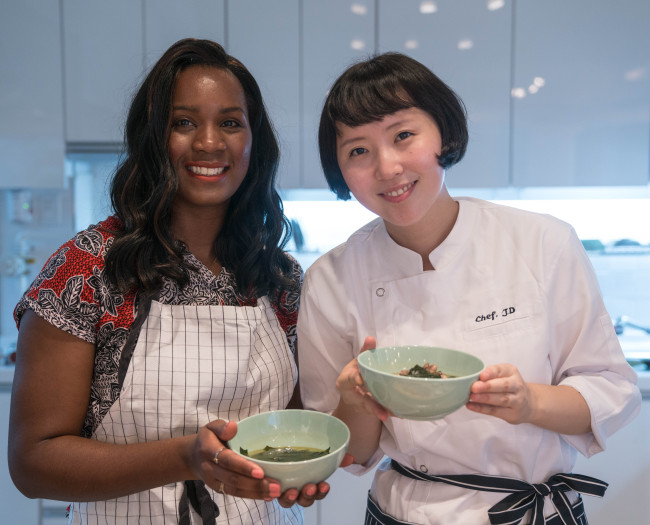Korean cooking classes rise as immersive travel activities
By Rumy DooPublished : Nov. 13, 2017 - 16:01
Rozenne, born to French and Korean parents, had spent most of her life in France watching her mother cook Korean food in the kitchen of their Strasbourg home.
Now, 25 years old and fresh out of university, she is in Korea to travel, see family and learn Korean cooking for the first time.
On Thursday, she tried her hand at two staple dishes -- ttukbaegi bulgogi (beef stew) and Japchae (glass noodle stir-fried with vegetables) -- at a cooking studio run by food company CJ Cheil Jedang in Jung-gu, Seoul.
“I’ve always eaten Korean food and seen my mother cook. But I had never had the opportunity to learn, until now,” she told The Korea Herald.
One-day cooking classes tailored to foreign visitors have risen as an immersive travel activity.
The Seoul Metropolitan Government, in partnership with CJ Cheil Jedang, is offering the Hallyu K-Food Cooking Class on the second and fourth Thursdays of each month. During the two-hour session, students first watch the chef cook as an interpreter gives the instructions in English. Then they try their hands at preparing the dish at the studio’s 18 cooking stations, complete with stoves and sinks.
Afterwards, the participants sit down and enjoy the food together.
Now, 25 years old and fresh out of university, she is in Korea to travel, see family and learn Korean cooking for the first time.
On Thursday, she tried her hand at two staple dishes -- ttukbaegi bulgogi (beef stew) and Japchae (glass noodle stir-fried with vegetables) -- at a cooking studio run by food company CJ Cheil Jedang in Jung-gu, Seoul.
“I’ve always eaten Korean food and seen my mother cook. But I had never had the opportunity to learn, until now,” she told The Korea Herald.
One-day cooking classes tailored to foreign visitors have risen as an immersive travel activity.
The Seoul Metropolitan Government, in partnership with CJ Cheil Jedang, is offering the Hallyu K-Food Cooking Class on the second and fourth Thursdays of each month. During the two-hour session, students first watch the chef cook as an interpreter gives the instructions in English. Then they try their hands at preparing the dish at the studio’s 18 cooking stations, complete with stoves and sinks.
Afterwards, the participants sit down and enjoy the food together.

The menu typically consists of simple Korean dishes that are both filling and can easily be prepared abroad, such as kimbap (rice rolls), tteokbokki (spicy rice cakes) and mandu (dumplings).
A different theme is prepared for each month. In June, participants cooked dishes featured in the reality show “Youn’s Kitchen,” which ran from March to May on tvN. October saw the theme “Halal Korean Food,” where participants used Halal ingredients and cooking methods.
Since the cooking classes kicked off in April, tourists from 32 countries have participated, with an average of 15 students per class, according to the Seoul Metropolitan Government.

Many of the students say they were initially drawn to Korean culture through entertainment.
Mingshu, 31, from Singapore, recently quit her job to travel the world. During her three-month stay in Korea, she found out about the cooking class through an online ad.
“I’ve been familiar with Korean culture for a while, which naturally led to an interest in the food,” she said. “I love Korean variety programs like ‘Running Man’ and ‘The Return of Superman.’ My mom is always watching some Korean drama or other.”
Two participants from Switzerland -- Julia, 18, and Enya, 19 -- said they planned to immerse themselves in Korean culture during their monthlong stay here.
“We first learned about Korean culture through drama and K-pop, but now we want to learn the language and culture, like the gestures and politeness, ducking when you say hello and everything,” said Julia.
Visitors can sign up for classes at english.visitseoul.net. Fees are 20,000 won per person.
Intimate cooking classes in Hongdae

Cooking studios are teaming up with travel apps such as Trip Advisor and Airbnb Trip to reach out to foreign visitors.
I Love Hansik, a company that offers cooking classes and food trips for tourists, has a studio in the Yeonnam-dong district.
The company offers Korean cooking classes in English, Japanese and Chinese on weekdays.
“I saw a lot of cooking classes and food tours when traveling abroad, but realized there aren’t many such programs here in Korea,” said the company’s CEO and chef Lee Min-jung. The company, founded by Lee and graduate students from Korea, China and Japan studying culture, art and management, has been fortunate enough to receive some of its funding from the government, Lee said.
During a class on Nov. 7, French students learned how to make a Korean home meal consisting of side dishes, soup and rice. Participants enjoyed premium Korean makgeolli and sweets along with the meal.
Street food and traditional food classes are available as well.
“We get tourists from all over the world, the US, Australia, France, China, Japan, Argentina, etc.,” said Lee. “Most are people who enjoy cooking in their home countries.”
The classes go beyond cooking to offer a space where people of different cultures can interact, said Lee. “We usually have small, intimate groups where people can talk about the food culture in their countries. One Japanese participant brought snacks from home to share with others, and promised to return in December,” she said.
Booking is available at www.ilovehansik.com.

More classes
There are a number of other Korean food cooking classes aimed at foreign visitors.
Itaewon Global Village Center, established to help foreign residents in Seoul, will be offering a vegan cooking class on Nov. 23. The menu will be kimchi buckwheat rolled crepes. The class aims to give participants an opportunity to learn about natural and healthy Korean temple food. The fee is 10,000 won per class. Visit global.seoul.go.kr for more information.
At Food and Culture Academy (www.fnckorea.com), courses are offered for popular Korean menu items such as bulgogi, savory seafood pancakes, kimchi, bibimbap and more. A class for vegetarian meals is available separately. Visit www.fnckorea.com for more information.
O’ngo Food Communications, known for its culinary tours of popular eateries for tourists, offers an array of Korean cooking classes for beginner, intermediate and advanced cooks. Halal cooking classes are also offered. Visit ongofood.com for more information.
By Rumy Doo (doo@heraldcorp.com)
















![[KH Explains] Hyundai's full hybrid edge to pay off amid slow transition to pure EVs](http://res.heraldm.com/phpwas/restmb_idxmake.php?idx=652&simg=/content/image/2024/04/18/20240418050645_0.jpg&u=20240418181020)

![[Today’s K-pop] Zico drops snippet of collaboration with Jennie](http://res.heraldm.com/phpwas/restmb_idxmake.php?idx=642&simg=/content/image/2024/04/18/20240418050702_0.jpg&u=)